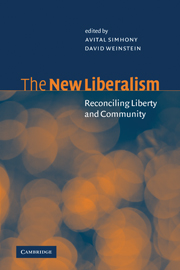Book contents
- Frontmatter
- Contents
- List of contributors
- Acknowledgments
- Introduction: The new liberalism and the liberal–communitarian debate
- 1 Liberal community: an essay in retrieval
- 2 T. H. Green on individual rights and the common good
- 3 T. H. Green's complex common good: between liberalism and communitarianism
- 4 Private property, liberal subjects, and the state
- 5 Neutrality, perfectionism, and the new liberal conception of the state
- 6 Bosanquet's communitarian defense of economic individualism: a lesson in the complexities of political theory
- 7 The new liberalism and the rejection of utilitarianism
- 8 Staunchly modern, non-bourgeois liberalism
- 9 The new liberalism and citizenship
- Select bibliography
- Index
3 - T. H. Green's complex common good: between liberalism and communitarianism
Published online by Cambridge University Press: 06 July 2010
- Frontmatter
- Contents
- List of contributors
- Acknowledgments
- Introduction: The new liberalism and the liberal–communitarian debate
- 1 Liberal community: an essay in retrieval
- 2 T. H. Green on individual rights and the common good
- 3 T. H. Green's complex common good: between liberalism and communitarianism
- 4 Private property, liberal subjects, and the state
- 5 Neutrality, perfectionism, and the new liberal conception of the state
- 6 Bosanquet's communitarian defense of economic individualism: a lesson in the complexities of political theory
- 7 The new liberalism and the rejection of utilitarianism
- 8 Staunchly modern, non-bourgeois liberalism
- 9 The new liberalism and citizenship
- Select bibliography
- Index
Summary
Introductory
One major way of capturing the liberal–communitarian debate is in terms of Sandel's dichotomous classification of “politics of rights” as opposed to “politics of the common good.” Liberal politics of rights is premised on the Kantian claim that the right is prior to the good. Communitarians question that claim and ground the politics of the common good in a conception of the good life while claiming Hegel and Aristotle as their intellectual resources. According to this classification liberals fail to (and indeed cannot) recognize a genuine shared common good.
In a vigorous response to communitarian criticism Holmes argues that liberals hold “an emphatic conception of the common good.” Because they are pluralists, liberals, he holds, do not provide a definition of “the good life” as opposed to “the bad life”; but they do provide an obligatory distinction between “right action” and “wrong action”: “Rightness … defines the liberal conception of the common good.” Though pronounced in response to communitarian criticism, that liberal conception of the common good is not entirely new.
Interestingly, Taylor makes a similar claim from a communitarian-republican standpoint. He recognizes that because “[t]he ethic central to liberal society is ethic of the right, rather than the good,” “procedural liberalism” cannot recognize “a socially endorsed conception of the good;” but liberalism can and does endorse a conception of common good in terms of the right.
The liberal–communitarian dualism is, therefore, no longer between politics of rights and politics of the common good, but rather between two rival, liberal and communitarian-republican, conceptions of the common good.
- Type
- Chapter
- Information
- The New LiberalismReconciling Liberty and Community, pp. 69 - 91Publisher: Cambridge University PressPrint publication year: 2001
- 2
- Cited by



